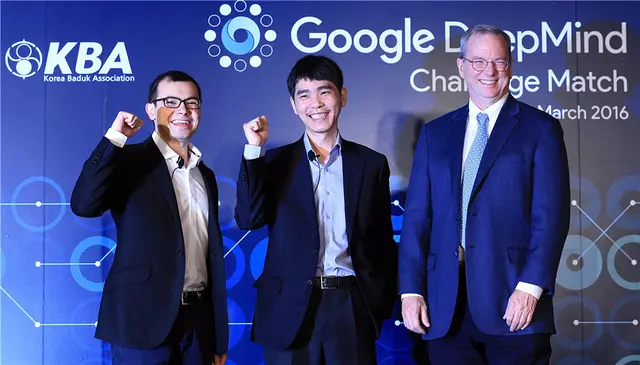Lee Sedol reviews the fourth match of the Google DeepMind Challenge Match against Google's artificial intelligence program AlphaGo.PHOTO: REUTERS
(THE STRAITS TIMES) On March 15, 2016, supercomputer AlphaGo beat South Korean Go grandmaster Lee Sedol, in a fifth and final matchup.
The Google-developed artificial intelligence (AI) programme won four out of five games and the prize money of US$1 million (S$1.38 million) will be donated to charity. Mr Lee earned US$150,000 and was awarded another US$20,000 for winning the fourth game.
The game of Go, or weiqi, is an ancient one and was generally regarded as too complex and intuitive a game for AI to excel at. Here are five things to know about the game.
1. AN ANCIENT ASIAN GAME
Co-founder of Google's artificial intelligence (AI) startup DeepMind, Demis Hassabis (left), South Korean professional Go player Lee Se-dol (centre) and former Google CEO and current Alphabet Executive Chairman, Eric Schmidt pose for photographers during a press conference in Seoul. PHOTO: EPA
It is widely accepted that Go first came into being 4,000 years ago. Developed in ancient China, the game is also known as Weiqi, which translates as "surrounding game". A popular legend claims that Go was invented by the sage-king Emperor Yao to educate his son. Another theory suggests that Go was the brainchild of astrologers, although archaeologists have yet to discover evidence to support this. By the Tang dynasty, Go was already a popular pastime among the Japanese aristocracy. Today, the name Go is adapted from the Japanese word Igo, which also means "surrounding boardgame".
2. THE BASICS OF GO
South Korean professional Go player, Lee Se-dol speaks during a press conference in Seoul, on March 8, 2016. PHOTO: EPA
The game is usually played on a board consisting of 19 X 19 lines. Players take turns to place stones on the intersections of the lines, with the aim of surrounding more empty territory than their opponent. They will also gain territory by surrounding and capturing their opponent's stones. The player with black stones starts, but the game only ends after both players choose to pass, one after the other. They then proceed to count the number of empty spaces surrounded by their stones and the player with the higher number of empty spaces wins. In the fourth game, Mr Lee played with white stones and clinched his single victory when AlphaGo resigned after 180 moves.
3. GO RANKINGS
South Korean professional Go player Lee Se-dol (centre) poses for the camera with Executive Chairman of Alphabet Inc. Eric Schmidt (right) and Demis Hassabis, co-founder of Google DeepMind. PHOTO: EPA
Having acquired 18 international titles, Lee Sedol is amongst the world's best Go players. He has received the ninth dan professional ranking, reserved for only the most highly skilled grandmasters. AlphaGo was also awarded an honorary ninth dan professional certificate.
The Singapore Weiqi Association estimates that there are around 100 professional ninth-dan Go players in the world.
Most beginners will take two to three years to achieve a one dan ranking. Mr Lee became a professional player when he was a 12-year-old and reached the ninth dan rank when he was a 21-year-old.
4. GO IN LITERATURE
South Korean professional Go player Lee Se-Dol speaks after his third match against AlphaGo. PHOTO: EPA
The earliest known literary records of Go include the Analects of Confucius, which mentions Go as a better way to spend one's time than being idle.
Go is also featured in more recent novels, like popular Hong Kong wuxia novelist Louis Cha's Demi-Gods And Semi Devils. In this novel, one of the main characters accidentally wins a game of Weiqi and becomes the new leader of the Carefree Sect, a fictional martial arts sect.
5. WHERE TO GO?
(From left) Head coach, Yang Jin Hua, 64, Ho Jia Xuan, 29, Kenneth Ng, 30 and Tan Teng Chuan, 62, playing weiqi/Go Game while watching the live streaming between Korean grandmaster Lee Se Dol and new artificial supercomputer, AlphaGo. ST PHOTO: ALICIA CHAN
The Singapore Weiqi Association provides training classes at the Bishan Clubhouse and the City Clubhouse as well as for schools. They also organise local Weiqi competitions, and send participants who have passed their selection games overseas for competitions. Classes are organised by The GO Academy too. Go enthusiasts can look forward to The GO Academy Cup, which will take place at Ulu Pandan Community Club Hall, on Apr 3, 2016.The GO Academy Cup is open to members of the public to observe. Held from 9am to 6pm, spectators can walk in without any prior reservation.
 简体中文
简体中文



